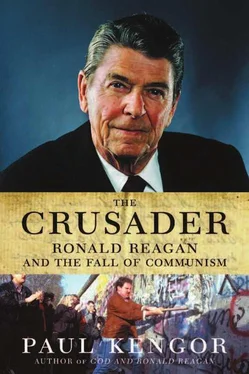Ford knew he was suddenly vulnerable. After New Hampshire, he had surged to five consecutive decisive victories, at times by big margins. These wins came in mostly eastern states, including the liberal northeast. As Martin Anderson remembered, the unasked question to Reagan by his campaign staff was, “When are you going to quit?” Reagan, however, was adamant. “I’m taking this all the way to the convention in Kansas City,” he declared defiantly, “and I’m going even if I lose every damn primary between now and then.” 39Reagan laid out a plan of action, while his doubtful handlers observed in disbelief, dreading the specter of twenty-some painful primaries ahead.
Immediately after that decision, Reagan won North Carolina, claimed a huge triumph in Texas, and followed with victories in Indiana, Georgia, and Alabama. The Ford team began shaking in its boots. In a stunning turnabout, a new question was posed: Could Reagan go to the convention and win enough delegates on the first ballot? Reagan estimated a “very great possibility, if not probability,” that he could do just that. 40
Reagan’s affront had been so productive that Ford not only dropped the word “détente” but replaced it with the preferred phrase of Reagan: “peace through strength.” This Reagan credo, which became more pronounced in the 1980 campaign and the presidency that followed, proffered that a strong America, equipped with and embarking upon a military and technological buildup, could (among other things) hurt the USSR by prompting it to spend money that its economy did not have. “The Russians,” declared Reagan that May, “know they can’t match us industrially or technologically.” 41
In a pronouncement that signaled a startling concession, a waffling President Ford declared: “Our policy for American security can best be summarized in three simple words of the English language: peace through strength.” 42Reagan chuckled, noting it was “a slogan with a nice ring to it.” 43
PREPARING FOR THE CONVENTION
As the convention drew nearer, Reagan’s rhetorical victories over Ford had become increasingly clear. Not only had he succeeded in changing the Republican perception of the word détente, but his supporters also sought to add a plank titled “morality in foreign policy” to the party platform:
We recognize and commend that great beacon of human courage and morality, Aleksandr Solzhenitsyn, for his compelling message that we must face the world with no illusions about the nature of tyranny. Ours will be a foreign policy that keeps this ever in mind….
Agreements that are negotiated, such as the one signed in Helsinki, must not take from those who do not have freedom the hope of one day gaining it….
Honestly, openly, and with conviction, we must go forward as a united people to forge a lasting peace in the world based upon our deep belief in the rights of man, the rule of law and guidance by the hand of God. 44
The plank was widely reported as a repudiation of Ford-Kissinger foreign policy. 45Fittingly, it quoted Solzhenitsyn, the esteemed Russian dissident who was among the more eloquent and credible critics of détente. In the summer of 1975, Solzhenitsyn had said the following to an AFL-CIO audience in Washington, DC:
I have tried to convey to your countrymen the constrained breathing of the inhabitants of Eastern Europe in these weeks when an amicable agreement of diplomatic shovels will inter in a common grave bodies that are still breathing. I have tried to explain to Americans that 1973, the tender dawn of détente, was precisely the year when the starvation rations in Soviet prisons and concentration camps were reduced even further. And in recent months, when more and more Western speechmakers have pointed to the beneficial consequences of détente, the Soviet Union has adopted a novel and important improvement in its system of punishment: to retain their glorious supremacy in the invention of forced-labor camps, Soviet prison specialists have now established a new form of solitary confinement—forced labor in solitary cells. That means cold, hunger, lack of fresh air, insufficient light, and impossible work norms; the failure to fulfill these norms is punished by confinement under even more brutal conditions. 46
To Reagan, this complaint was exactly on the mark. Such statements brought him enormous respect for Solzhenitsyn—one that Solzhenitsyn showed was mutual. 47
Not surprisingly, Solzhenitsyn’s jailers disrespectfully disagreed with him and Reagan. And it was during this period that the “California cowboy” drew the full wrath of the Soviet press and became a household name in the Kremlin, as all of Reagan’s remarks were agonizingly reported throughout the Soviet press. 48Commentator-propagandist Valentin Zorin, in a statement issued by the Moscow Domestic Service, screeched that Reagan was seeking to “poison the atmosphere” and “sow doubts about” and even “wreck” détente. He had demonstrated “complete irresponsibility” in suggesting that only the USSR profited from détente, at America’s expense. 49
Separately, a well-sourced Izvestia report on the coming 1976 Republican convention, sarcastically titled, “Reagan Applies the ‘Corrective,’” tied together clips from the U.S. media, as well as interviews by its own correspondent, in showing how Reagan had influenced Ford. Izvestia dubbed the morality plank “the Reagan amendment,” and derided its “bombastic, pompous title: ‘Morality in Foreign Policy.’” While this harsh language was scathing, it was by no means unique. Indeed, any Reagan talk of morality drew particular ire from the Soviet Communist press, which viewed such statements with a highly inflammatory eye. 50
AUGUST 19, 1976: THE REPUBLICAN CONVENTION
All of this came to a head on August 19, 1976, when Republicans held their convention at the Kemper Arena in Kansas City, where Reagan, in the end, did not get the nomination. Amid the letdown, Reagan’s boosters did not realize that the events of the convention had positioned their man as the Republican front-runner four years later. This was not simply because he had come so close to winning in 1976, but also because of his dramatic performance in Kansas City that evening.
President Ford had just finished speaking, and as a gesture of reconciliation and goodwill, he waved from the podium to the Reagans, seated in a skybox. He beckoned Reagan to come down to speak. The Republican faithful exhorted, “Ron! Ron! Ron!” They chanted, “Speech! Speech! Speech!”
None of this had been rehearsed for the cameras. A blushing Reagan had not planned to speak. He refused, gesturing his hands downward, pushing delegates to sit down and shut up. “It’s his night,” he muttered to friends, deferring to Ford. “I’m not going down there.” Ford graciously pressed on: “Ron, will you come down and bring Nancy?” 51National television audiences watched in anticipation, as ABC, CBS, and NBC news anchors peered through binoculars with moment-by-moment commentary.
Reagan turned to Mike Deaver: “But what will I say?” He eventually obliged. As he trotted down the corridors on his way to the podium, he said to Nancy, “I haven’t the foggiest idea what I’m going to say.” 52This cluelessness was evident in the way he began his remarks. He offered salutations and thanks, to the Fords, to Vice President Nelson Rockefeller, and others. He then offered a couple of rambling, disjointed, customary sentences of appeal to voters, stammering something unmemorable about party platforms. Then a thought came to him. “If I could just take a moment,” he began, taking a pause as he at last decided what he was going to say: 53
I had an assignment the other day. Someone asked me to write a letter for a time capsule that is going to be opened in Los Angeles a hundred years from now, on our tercentennial. It sounded like an easy assignment. They suggested I write something about the problems and issues of the day and I set out to do so, riding down the coast in an automobile looking at the blue Pacific out on one side and the Santa Ynez mountains on the other, and I couldn’t help but wonder if it was going to be that beautiful a hundred years from now as it was on that summer day.
Читать дальше












